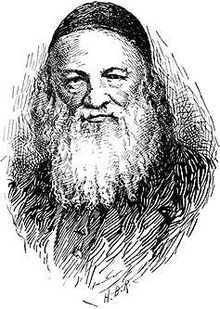| Revision as of 05:11, 4 March 2008 editMPerel (talk | contribs)Extended confirmed users, Pending changes reviewers, Rollbackers12,056 editsm cleanup using AWB← Previous edit | Revision as of 09:08, 7 March 2008 edit undo217.132.234.102 (talk)No edit summaryNext edit → | ||
| Line 5: | Line 5: | ||
| After various experiences in business, Rapoport became successively rabbi of ] (1837) and of Prague (1840). He was one of the founders of the new "]" movement. His chief work was the first part of an (]) encyclopaedia (Ereklz Millin, 1852). Equally notable were his biographies of ], ] (author of the ]), ], ] and others. | After various experiences in business, Rapoport became successively rabbi of ] (1837) and of Prague (1840). He was one of the founders of the new "]" movement. His chief work was the first part of an (]) encyclopaedia (Ereklz Millin, 1852). Equally notable were his biographies of ], ] (author of the ]), ], ] and others. | ||
| Thrown upon his own resources about 1817, Rapoport became cashier of the meat-tax farmers. He had already given evidence of marked critical ability, though his writings previously published were of a light character—poems and translations. His critical talent, however, soon revealed itself. In 1824 he wrote an article for ''Bikkure ha'Ittim'' on the independent Jewish tribes of ] and ]. Though this article gained him some recognition, a more permanent impression was made by his work on Saadia Gaon and his times (published in the same journal in 1829), the first of a series of biographical works on the medieval Jewish sages. Because of this work he received recognition in the scholarly world and gained many enthusiastic friends, especially ] (Bernfeld, ''Toledot Shir'', p. 33). | Thrown upon his own resources about 1817, Rapoport became cashier of the meat-tax farmers. He had already given evidence of marked critical ability, though his writings previously published were of a light character—poems and translations. His critical talent, however, soon revealed itself. In 1824 he wrote an article for ''Bikkure ha-'Ittim'' on the independent Jewish tribes of ] and ]. Though this article gained him some recognition, a more permanent impression was made by his work on Saadia Gaon and his times (published in the same journal in 1829), the first of a series of biographical works on the medieval Jewish sages. Because of this work he received recognition in the scholarly world and gained many enthusiastic friends, especially ] (Bernfeld, ''Toledot Shir'', p. 33). | ||
| After the fashion in rabbinic circles, Rapoport was known by an acronym "Shir", formed by the initial letters of his Hebrew name '''Sh'''elomo '''Y'''ehuda '''R'''apoport. | After the fashion in rabbinic circles, Rapoport was known by an acronym "Shir", formed by the initial letters of his Hebrew name '''Sh'''elomo '''Y'''ehuda '''R'''apoport. | ||
Revision as of 09:08, 7 March 2008


Solomon Judah Löb Rapoport (June 1, 1790 in Lemberg, Kingdom of Galicia and Lodomeria, Austria – October 16, 1867 in Prague) (Hebrew: שלמה יהודה כהן רפאפורט), was a Galician rabbi and Jewish scholar.
After various experiences in business, Rapoport became successively rabbi of Tarnopol (1837) and of Prague (1840). He was one of the founders of the new "Wissenschaft des Judentums" movement. His chief work was the first part of an (unfinished) encyclopaedia (Ereklz Millin, 1852). Equally notable were his biographies of Saadia Gaon, Nathan (author of the Arukh), Hai Gaon, Eleazar Kalir and others.
Thrown upon his own resources about 1817, Rapoport became cashier of the meat-tax farmers. He had already given evidence of marked critical ability, though his writings previously published were of a light character—poems and translations. His critical talent, however, soon revealed itself. In 1824 he wrote an article for Bikkure ha-'Ittim on the independent Jewish tribes of Arabia and Abyssinia. Though this article gained him some recognition, a more permanent impression was made by his work on Saadia Gaon and his times (published in the same journal in 1829), the first of a series of biographical works on the medieval Jewish sages. Because of this work he received recognition in the scholarly world and gained many enthusiastic friends, especially S. D. Luzzatto (Bernfeld, Toledot Shir, p. 33).
After the fashion in rabbinic circles, Rapoport was known by an acronym "Shir", formed by the initial letters of his Hebrew name Shelomo Yehuda Rapoport.
References
 This article incorporates text from a publication now in the public domain: Chisholm, Hugh, ed. (1911). Encyclopædia Britannica (11th ed.). Cambridge University Press.
This article incorporates text from a publication now in the public domain: Chisholm, Hugh, ed. (1911). Encyclopædia Britannica (11th ed.). Cambridge University Press. {{cite encyclopedia}}: Missing or empty|title=(help) This article incorporates text from a publication now in the public domain: Singer, Isidore; et al., eds. (1901–1906). "Solomon Judah Löb Rapoport". The Jewish Encyclopedia. New York: Funk & Wagnalls.
This article incorporates text from a publication now in the public domain: Singer, Isidore; et al., eds. (1901–1906). "Solomon Judah Löb Rapoport". The Jewish Encyclopedia. New York: Funk & Wagnalls.